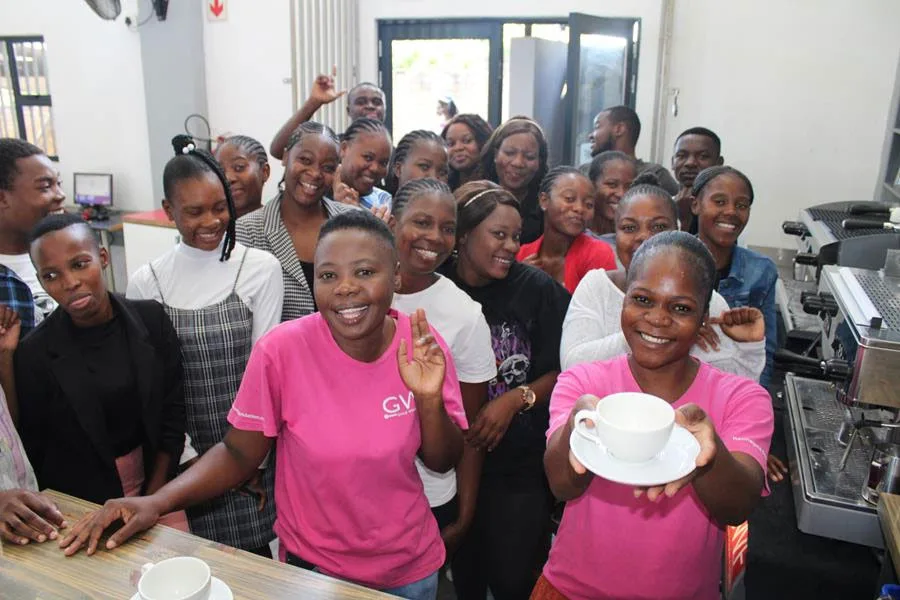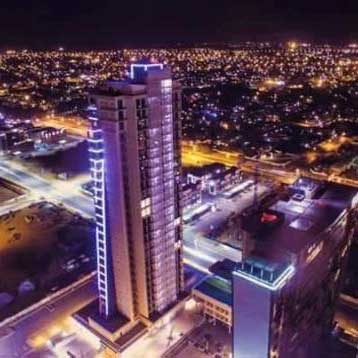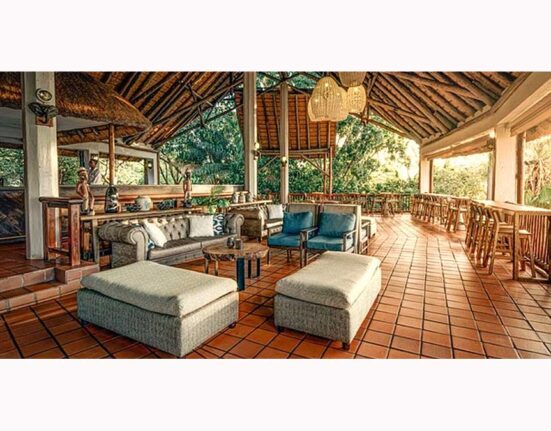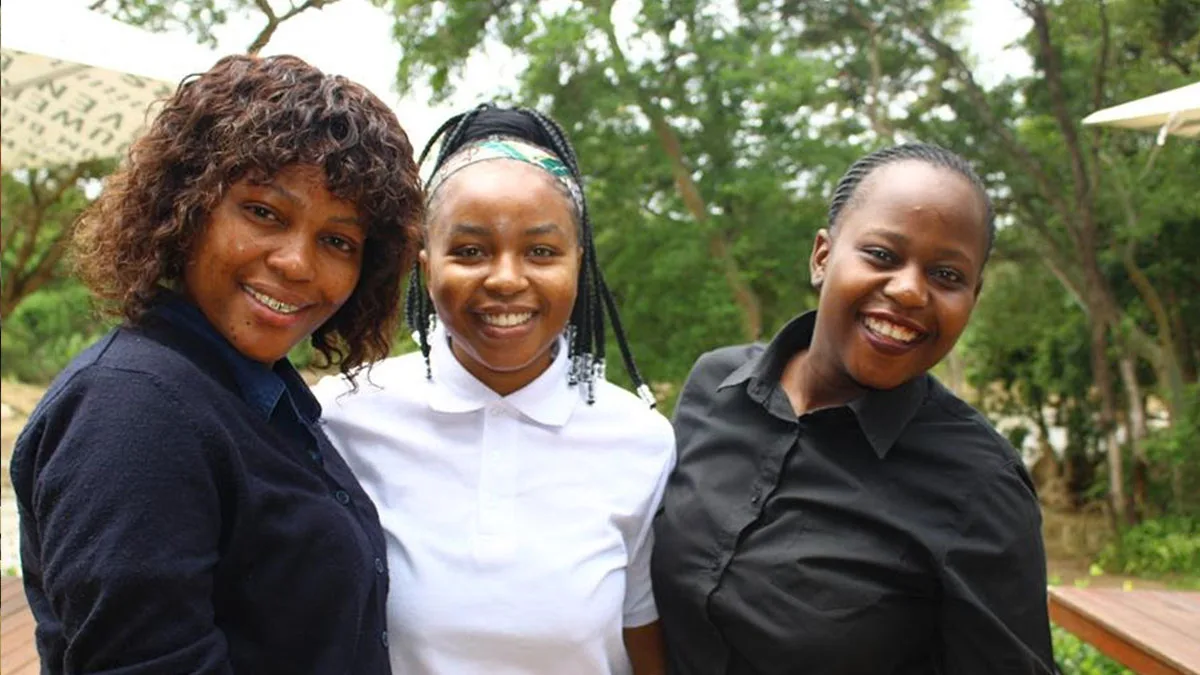Mpumalanga has a rich and thriving hospitality industry, but where does the pipeline of new staff come from? And how does the average young rural person get a foot in the door of a game lodge, restaurant or tourism establishment to follow their dream career?
In a jobs-poor country like South Africa, non-profits such as Good Work Foundation (GWF) have stepped in to fill the gap. Young people now have the opportunity to study, upskill themselves, gain work experience and then be first in line to clinch an internship or job placement – something that can change their lives and prospects forever.
GWF’s finely honed Ecosystem of Learning and Working model can be seen in dynamic action at establishments such as Hippo Hollow Country Estate in Hazyview, close to the Kruger National Park.
Stories of hope in rural Mpumalanga
Three bubbly GWF Bridging Year Academy (BYA) graduates – Vezokuhle Hlabane (21), Dansile Bulunga (26) and Ayanda Dube (29) – are currently interning or working full-time at the lodge. With their families dependent on their income, their lives and circumstances have been changed radically by earning a qualification and getting a job.
GWF’s highly sought-after one-year subsidised BYA course enables young people to bridge the gap between school and tertiary education or a job by equipping them with computer skills and sharpening their English fluency.
Hlabane, from Mkhuhlu in Bushbuckridge, attended the BYA before deciding to study further at the foundation’s Hospitality Academy. She is now a trainee at Hippo Hollow while pursuing an e-learning diploma in hotel management. She hopes to one day own her own establishment and create jobs for the youth in her area.
“Hard work, dedication and good time management have got me to where I am today, and I’m grateful for the opportunities I’ve had that will propel me to further success,” this go-getting young woman asserts. “Sleeping is for the rich; waking is for the successful!”
Dube, from Calcutta near the Kruger Gate, has had an “exciting journey” over the past few years after almost losing hope. Having dropped out of university after failing her first year, she opted instead to complete a BYA course in 2016 and was overjoyed to later be accepted into the Hospitality Academy.
“Mpumalanga has a rich hospitality industry and I think my people skills have helped me a lot,” she reflects. “At first, it wasn’t a passion for me – it was just a job. But I started to fall in love with hospitality, as it gave me purpose. I started as an intern and now I’m a commis chef [novice chef] – I enjoy working in the kitchen and learning about people’s dietary requirements.
“My home life has changed as well – life wasn’t easy before. As the firstborn, I’m the breadwinner and now I can support my siblings and kids.”
Bulunga, from Mshadza near Hazyview, dreamed of being a traffic officer when she was young. But after a short stint at a college in Nelspruit, she found herself sitting at home with no job and those dreams dashed.
“I applied to join the Bridging Year Academy and finally started seeing a way forward,” she relates. “On one occasion I was asked to present to the class, including to visiting overseas guests. I was scared but proud when I realised, ‘I can do it.’” She was later accepted into the Hospitality Academy, served an internship and was recently made permanent as a front-of-house receptionist at Hippo Hollow.
“I love interacting with guests and getting to know different cultures from around the world. I’ve also opened a business on the side – a spaza shop selling russians, chips and so on. I’d like to expand my business and, in the long term, have my own hotel and restaurant. I want people to know me for my head – by that I mean my work.”
Bulunga’s message to young people in Mpumalanga who have given up hope on their study and career journeys is, “Do not give up. Keep pushing!”
GWF Hospitality Academy facilitator Tarshine Mafuyeka says the academy takes 20 students every year, drawn mainly from Lowveld villages. The course – with modules in front-of-house, housekeeping, table attendance, and professional appearance and comportment – is an introduction to hospitality that serves as a springboard to further studies or placements.
This holistic course comes from the South African College of Tourism, and is accredited by the Culture, Art, Tourism, Hospitality and Sport Sector Education and Training Authority (CATHSSETA).
“Our aim is to try to place them at establishments in the area, although some get jobs outside Mpumalanga,” she explains. “I must say, our graduates get snapped up quite quickly! People here want to hire local people, because of their local knowledge and as a way of giving back to the community.”
Building a ‘tribe’ of mutual support to get a headstart in life
Says Kathleen Hay, programme manager of GWF’s Travel & Tourism Academy, “The world of work can be an incredibly bewildering and lonely place, and it’s so difficult to build a network and get connected with the right people when you’re starting out.
“That’s why we came up with a holistic model that builds a close-knit community or ‘tribe’ to nurture young graduates through that all-important transition between learning, training and work, and beyond. It’s a golden key that unlocks opportunities for them.”

Besides this, through its various vocation-based academies, GWF offers these young people further training in areas such as hospitality, information technology and conservation – skills that are in demand in rural areas because of their employment potential in the tourism and business process outsourcing fields.
GWF also partners with establishments such as local game lodges to get these graduates placed in internships and, often, full-time employment – supporting them on each step of their learning and career journeys.
Some of the graduates are even reabsorbed back into GWF’s growing team – as facilitators or staff on the various campuses, or as IT support agents at its social enterprise, VillageUp, a business process outsourcing centre working on a number of national and international clients.
Plus, GWF’s Open Learning Academy programme introduces Grade 3s and 4s to coding and robotics, while strengthening their English and mathematics literacy skills, to prepare them for the 21st-century workplace – further adding to its ecosystem of impact.
“It’s like one big extended family that keeps on growing,” says Hay.








